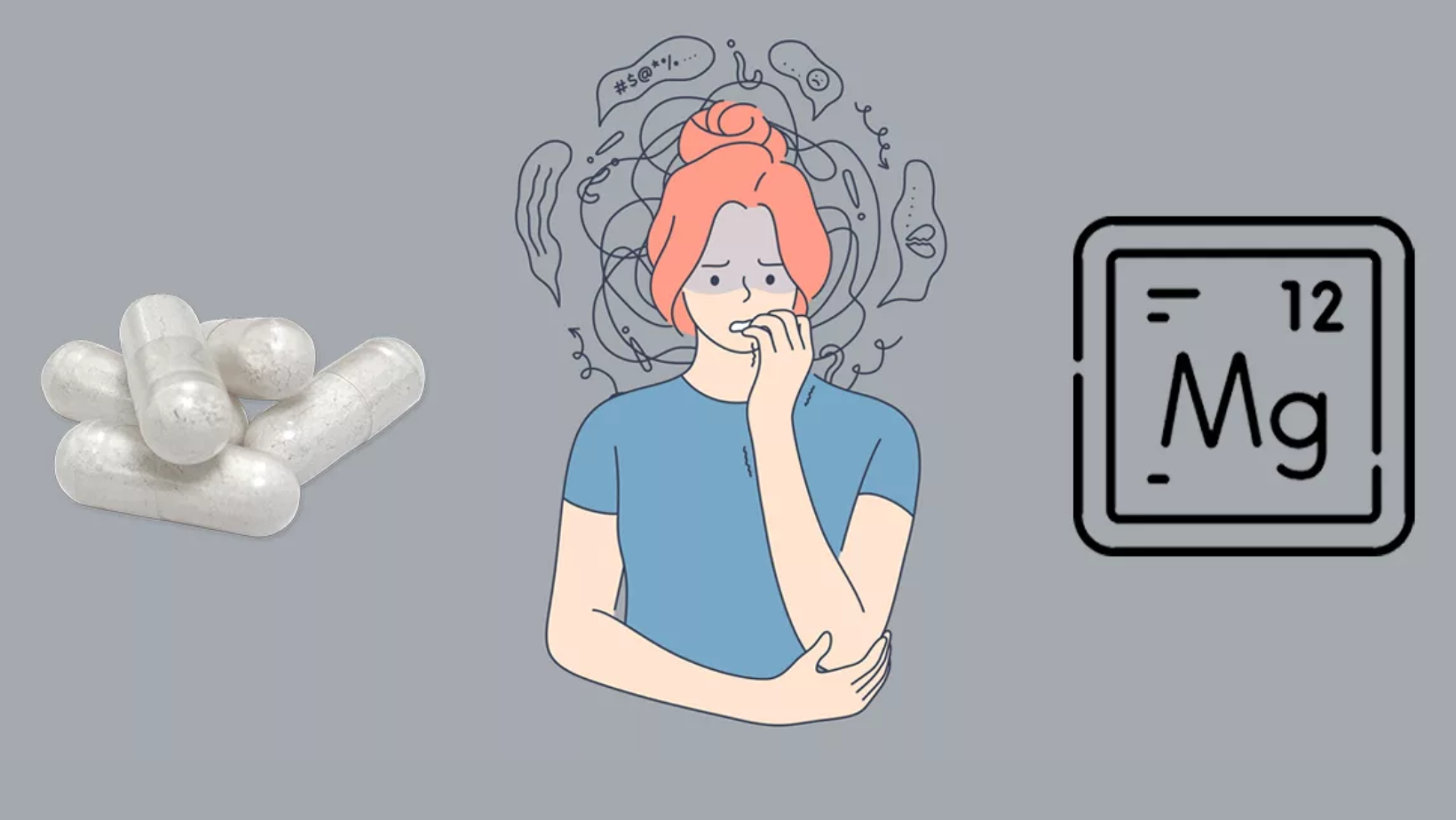
Anxiety is a widespread mental health concern, with 30% of adults experiencing anxiety disorders at some point in their lives. With so much worrying going on, it’s no surprise that advice on how to reduce anxiety frequently appears on social media feeds. One purported solution? Magnesium.
If you’re wondering if magnesium can help reduce anxiety, read on to find out what experts say. Keep in mind that you should always see your doctor before starting any supplements, especially if you are also taking other vitamins or drugs.
Magnesium: What Is It?
A registered dietitian at Northwestern Medicine Palos Hospital in Palos Heights, Illinois, Rana Ahmad states that magnesium is the second most important mineral in our cells, behind potassium. She goes on to say that among many other things, magnesium helps control our body’s stress response, blood pressure, glucose levels, and the synthesis of energy. It should come as no surprise that magnesium has so many functions; according to some studies, 70% of the body’s enzymes require magnesium to function correctly.
The main neurotransmitter involved in relaxation, gamma-aminobutyric acid (GABA), appears to be increased by magnesium, according to David C. Leopold, M.D., medical director of Hackensack Meridian Integrative Health and Medicine at Jersey Shore University Medical Center.
Dr. Leopold adds that research indicates magnesium may also block NMDA receptors, which lessen the effects of glutamate, the main excitatory neurotransmitter. “The stress-relieving and relaxing effects of magnesium seem to be produced by the combination of these two effects,” he explains. These consequences could help to explain why some studies have linked anxiety to a magnesium deficit. Reduced magnesium levels have the potential to increase NMDA receptor activity.
So how can you determine whether you’re getting adequate of this powerful mineral? The standard method for determining magnesium status is blood level measurement. However, having a normal blood level of magnesium does not guarantee that one has low levels. First off, just around 1% of the magnesium in your body is found in your blood. Magnesium can also be moved by your body from your bones to help maintain a steady blood level.
In typically healthy people, a clinical magnesium deficit due to low blood levels is rare. Having “magnesium inadequacy,” or obtaining some magnesium but not quite enough, is a more likely occurrence.
What Foods Are High in Magnesium?
For individuals over the age of 18, the recommended daily amount (RDA) for magnesium is 400 to 420 milligrams for males and 310 to 320 milligrams for women. It is advised to take an extra 40 milligrams each day while pregnant.
Foods derived from plants and animals both contain large amounts of magnesium; in fact, some magnesium is found in water. Dietary sources of magnesium include, for instance:
- Fruits (fresh or dried)
- Nuts or seeds
- Soy products
- Peas or beans
- Whole grains
- Dark, leafy greens
- Dairy products
Which Magnesium Helps with Anxiety the Most?
Ahmad asserts, “Magnesium is not created equal.” There are various salt forms of magnesium, each with slightly distinct characteristics. She goes on to say that you should always consult your doctor before beginning any new supplement since they can help you determine which type is appropriate for your particular needs.
Magnesium Citrate
“Magnesium citrate is quickly absorbed in the body but may cause some gastrointestinal distress like cramping or diarrhea,” says Ahmad. Speaking with your physician and adhering to the directions on the container can help alleviate possible gastrointestinal issues.
The citrate form of magnesium can help with anxiety and stress and may improve sleep and muscle tension, notes Dr. Leopold.
Magnesium Glycinate
The benefits of magnesium glycinate are similar to magnesium citrate, says Dr. Leopold. But Ahmad notes that magnesium glycinate is less likely to cause unwanted gastrointestinal side effects. Dr. Leopold points to the attached molecules called glycine—a natural chemical in the body. “Glycine has been shown to help with sleep,” he explains. Research shows glycine has a calming effect in the brain.
Magnesium L-threonate
Magnesium L-threonate is one of the most well-absorbed magnesium salts. In addition, some research shows supplementation leads to higher magnesium levels in the brain. Magnesium threonate has become very popular because it may help support brain health, adds Dr. Leopold. While the research is not as robust for this form, he thinks it’s a reasonable magnesium choice for individuals who are interested in taking it.
What Time of Day Is Ideal for Taking Magnesium for Anxiety?
Ahmad advises taking a magnesium supplement half an hour before bed because the soothing properties of the mineral may aid in sleep.
Additionally, Dr. Leopold advises taking magnesium pills at night—all save one. He continues, “It is best to take magnesium L-threonate in the morning.” Although, as Dr. Leopold has previously pointed out, there isn’t much solid evidence on this particular supplement type at this time, some researchers are investigating if taking supplements containing magnesium L-threonate can aid with focus and memory.
How Soon Does Magnesium Help with Anxiety?
Ahmad says, “You may start to notice a difference in as little as a few days,” adding that occasionally it can take up to two weeks of magnesium supplementation to show any results.
Dr. Leopold concurs, saying, “In my clinical experience, the reduction of anxiety and stress is also fairly rapid, usually within a few days.” However, stress and anxiety are multifaceted problems with a variety of causes, he continues, adding that the treatment plan also affects other variables.
The time it takes for the calming benefits to start working could vary depending on the type of magnesium used. According to Ahmad, magnesium citrate is absorbed more quickly than magnesium glycinate.
Side Effects and Precautions of Magnesium
According to Dr. Leopold, magnesium supplements are usually well taken, although adverse effects like nausea and diarrhea are possible. He suggests a low initial dose of magnesium, perhaps one-fourth of the suggested starting amount. He says you can increase your dose every few days if tolerated, all the way up to the full dose. Preventing gastrointestinal adverse effects may also be achieved by taking magnesium with food.
Ahmad advises that you should always see your doctor before beginning a supplement regimen. Dr. Leopold concurs, pointing out that not everyone can safely use a magnesium supplement, especially those who have the following medical conditions:
- Kidney disease
- Inflammatory bowel disorders
- Irregular heart rhythms
Ahmad and Dr. Leopold both point out that too much magnesium is not safe. Very large doses can be fatal, primarily due to effects on the heart, says Dr. Leopold (though he notes that at recommended doses, magnesium is generally very safe to take). However, he cautions against taking multiple supplement products containing magnesium, which may lead to a significant increase in the cumulative dose.
Interactions are another concern with magnesium supplements. If you take blood pressure medications, it’s possible magnesium could cause your blood pressure to drop too low, says Dr. Leopold. Some other notable interactions include:
- Potassium-sparing diuretics
- Oral bisphosphonates
- Tetracycline or quinolone antibiotics
There are many more possible interactions. Always check with your doctor or pharmacist to ensure magnesium is safe to take with your other medications and supplements.
When to See a Doctor
If you’re having anxiety issues, Dr. Leopold recommends seeing a doctor as soon as possible to make sure there’s no other underlying medical cause. He frequently recommends talk therapy for anxiety or stress issues.
Two forms of evidence-based psychotherapies that help with anxiety symptoms and do not rely on medications or supplements include cognitive behavioral therapy and somatic experiencing therapy.
Anxiety is a highly treatable condition, Dr. Leopold explains. While natural supplements may play a role, he says a multifactorial approach is often needed, which may include medication, talk therapy and lifestyle modifications.










